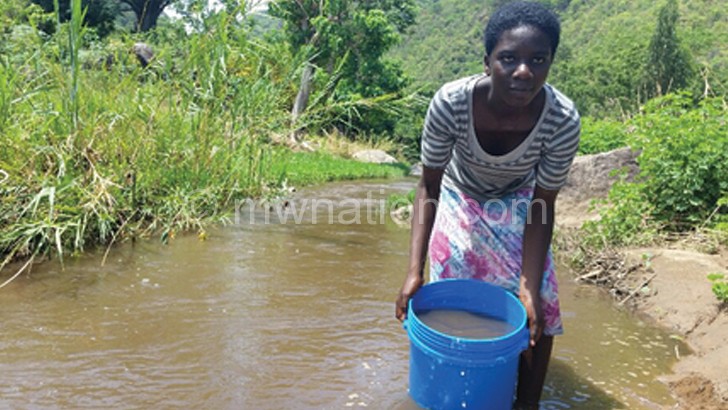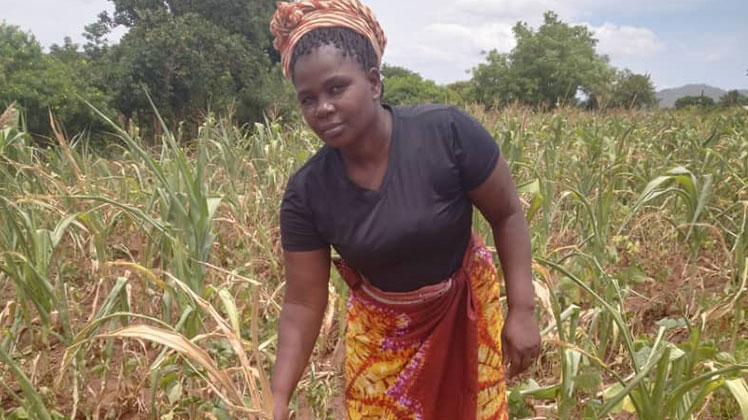Climate change worsens women’s suffering
Today, Malawi joins the rest of the world in commemorating International Women’s Day. As the country continues to fight for gender quality, gender sensitive policy responses to the effects of climate change are critical to ensure a productive agriculture sector and a food-secure growing population, writes EPHRAIM NYONDO.
Every day, 47-year-old Paulo Jekapo from Ngabu in Chikwawa District, wakes up at 4 am and walks for about five kilometres to fetch water. It is the only functional village borehole because the rest dried up due to dry spells that have been hitting the district. Besides fetching water, Jekapo has other things on her mind.

As a widow taking care of six orphans, she is the sole breadwinner of the household. With the acute food shortage that has left 2.8 million Malawians food insecure, Jekapo has no idea what her children will eat for the next meal.
“The erratic rains, which resulted into floods and dry spells in the last growing season, have resulted in poor crop yields. Every day I struggle to feed my six children as piece-works have become scarce,” Jekapo explains.
Unpredictable weather patterns have, in recent years, resulted in prolonged dry spells and severe floods in Malawi, making it difficult for the poorest access basic necessities for their family.
According to World Bank, 84 percent of Malawi’s 16 million-strong population lives in rural areas. As a result, millions of subsistence farmers, who are mostly women, are at the frontline of climate change.
Unreliable rains, either too heavy or none at all, ruin crops and results in poor crop yields. Food insecurity is rising and Malawi’s agricultural-based economy is suffering.
But while no sector of society is unaffected by effects of climate change, it is women such as Jekapo who shoulder the full weight of the problem.
“I travel long distances in search of water and firewood. Food has now become scarce and expensive,” says Jekapo.
She adds that from the small piece of land she owns, she can no longer produce enough food to see her family through the year. She is also unable to harvest any cotton, the crop she used to grow to earn some money.
Heather Maseko, assistant national coordinator for Civil Society Network for Climate Change (Cisonecc), says women are more vulnerable to the effects of climate change than men, primarily because they constitute the majority of the world’s poor and are more dependent for their livelihood on natural resources.
“Women contribute up to 70 percent of agricultural labour and perform over half of all agricultural tasks. In addition, they are responsible for the welfare of their families: accessing food, water, energy and good health for all members. This makes them susceptible to impacts of climate change which often affect food production, access to water, health and other natural resources,” she says.
Furthermore, adds Maseko, women face social, economic and political barriers that limit their coping capacity.
“Women and men in rural areas in developing countries are especially vulnerable when they are highly dependent on local natural resources for their livelihood. Those charged with the responsibility to secure water, food and fuel for cooking and heating face the greatest challenges,” she explains.
Maseko also notes that when coupled with unequal access to resources and to decision-making processes and limited mobility places women in rural areas in a position where they are disproportionately affected by climate change.
Noting the effects of climate change have increased poverty and reduced crop productivity especially among women, Mary Shawa, principal secretary for the Ministry of Gender, Children, Disability and Social Welfare fears that “many women now risk going into extramarital affairs to get food for their families”.
In fact, a 2009 Oxfam report titled The winds of change: Climate Change, Poverty and the Environment in Malawi warns that in the absence of food or an ability to sell crops, vulnerable women are resorting to sex-work and sexual favours to help feed their families, leading to an increased vulnerability to HIV and Aids.
However, Maseko feels that though gender has been recognised as a cross-cutting issue in the policy and in several other policies, in practice, gender mainstreaming has not been fully attained.
“Gender mainstreaming in climate change programme should consider the various needs and capabilities of women, men and children and purposely make interventions for these groups. Most interventions do not reflect the physical, cultural, economic and conditions of women; especially rural women farmers in the country,” she says, adding: “We need to do that now.” n





